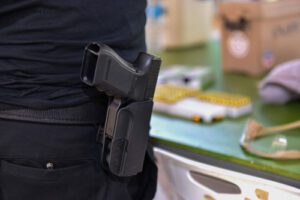 The District Court continued: Plaintiffs implore this Court to consider the only reasonable conclusion from Defendants’ posturing: their dragging of feet is evidence that no such historical tradition and evidence exists. Perhaps. At this juncture, there is no bona fide basis for this Court to withhold its ruling because the State says it needs more time to come forward with historical evidence that the Legislature represented it had at the time of the law’s passage. The Court will therefore proceed to consider the evidence and argument the parties have presented.
The District Court continued: Plaintiffs implore this Court to consider the only reasonable conclusion from Defendants’ posturing: their dragging of feet is evidence that no such historical tradition and evidence exists. Perhaps. At this juncture, there is no bona fide basis for this Court to withhold its ruling because the State says it needs more time to come forward with historical evidence that the Legislature represented it had at the time of the law’s passage. The Court will therefore proceed to consider the evidence and argument the parties have presented.
Defendants also remonstrate against the restraints, urging that the “risk of dangerous and fatal situations looms large if the sensitive places provisions are enjoined. For example, a crowded entertainment venue (such as sporting events) could become deadly if fan rivalries are aggravated by a volatile mix of alcohol and firearms. [State’s Br. at 36–37.] After all, “[a] shooting death or injury cannot be undone.” [Id. at 37.] It is a prod that seeks to embroil this Court in assessing the benefits of the challenged gun control regulations, something this Court is expressly prohibited from doing under Supreme Court jurisprudence. See Bruen, 142 S. Ct. at 2129 (explaining that “[a] constitutional guarantee subject to future judges’ assessments of its usefulness is no constitutional guarantee at all”) (citations and quotations omitted). The Court turns to the parties’ arguments.
To have standing, “a plaintiff must show (i) that he suffered an injury in fact that is concrete, particularized, and actual or imminent; (ii) that the injury was likely caused by the defendant; and (iii) that the injury would likely be redressed by judicial relief. TransUnion LLC v. Ramirez, 141 S. Ct. 2190, 2203 (2021) (citing Lujan v. Defenders of Wildlife, 504 U.S. 555, 560–561(1992)). Defendants first challenge any issuance of restraints on jurisdictional grounds, contending that each Plaintiff has failed to demonstrate concrete plans to imminently visit each of the challenged “sensitive places,” that Plaintiffs fail to establish any credible threat of enforcement, and that Plaintiffs have not demonstrated traceability or redressability as to their claims. This Court disagrees and finds that the Plaintiffs have sufficiently shown that they have suffered an imminent injury: not being able to carry their handguns in public locations for the purpose of self-defense, a right guaranteed by the Second Amendment. If Plaintiffs resumed such conduct, they would suffer imminent injury in the form of criminal penalties, which Defendants, who have not disavowed an intent to enforce the new law, have full authority to bring against them.
Implicit in the Court’s opinion is the assertion that the offending bill sponsors in the Legislature mis-represented their historical proofs. Another good point in support of Judge Bumb’s opinion is that New Jersey was just one of five states (and the District of Columbia) that did not allow permits-to-carry consistent with the Bruen decision before Bruen was decided.
